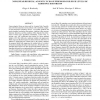Free Online Productivity Tools
i2Speak
i2Symbol
i2OCR
iTex2Img
iWeb2Print
iWeb2Shot
i2Type
iPdf2Split
iPdf2Merge
i2Bopomofo
i2Arabic
i2Style
i2Image
i2PDF
iLatex2Rtf
Sci2ools
ICASSP
2008
IEEE
2008
IEEE
Nonlinear residual acoustic echo suppression for high levels of harmonic distortion
Linear adaptive filters are often used for Acoustic Echo Cancellation (AEC) but sometimes fail to perform well in notebook computers and inexpensive telephony devices. Low-quality speakers and poorly-designed enclosures that produce vibrations often generate harmonic distortion, and this nonlinear effect degrades the performance of linear AEC algorithms considerably. In this work, we present a new AEC architecture that consists of a linear, subband adaptive AEC filter followed a nonlinear residual echo suppression (RES) stage specifically designed to address harmonic distortion. In addition to suppressing the residual echo in the primary subband, the proposed model also suppresses the residual echo in a window of bands surrounding the higher order harmonics. Results show considerable improvement over other proposed algorithms, and the new algorithm has much lower implementation costs compared to nonlinear AEC models based on Volterra filters and a previously proposed, nonlinear re...
ICASSP 2008 | Nonlinear Residual Echo | Residual Echo | Residual Echo Suppression | Signal Processing |
| Added | 30 May 2010 |
| Updated | 30 May 2010 |
| Type | Conference |
| Year | 2008 |
| Where | ICASSP |
| Authors | Diego A. Bendersky, Jack W. Stokes, Henrique S. Malvar |
Comments (0)

